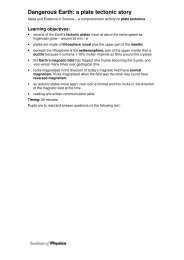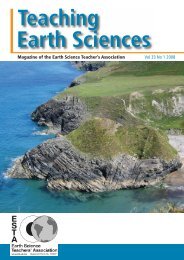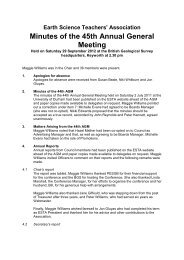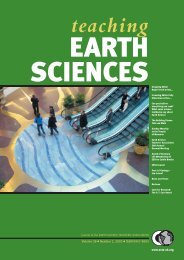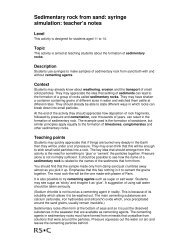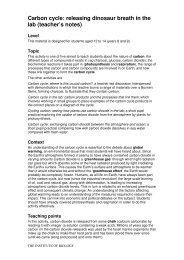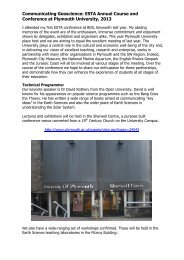teaching - Earth Science Teachers' Association
teaching - Earth Science Teachers' Association
teaching - Earth Science Teachers' Association
You also want an ePaper? Increase the reach of your titles
YUMPU automatically turns print PDFs into web optimized ePapers that Google loves.
TEACHING EARTH SCIENCES ● Volume 31 ● Number 4, 2006<br />
‘With time spent on commissioning articles and promoting<br />
the magazine there has been plenty of good<br />
copy and there is no longer the need to accept ‘anything<br />
that is offered’ for publication. This also means that the<br />
magazine can be better tailored to the readers’ interests.<br />
Research has been carried out to identify options for<br />
introducing colour printing while retaining the good<br />
reputation and quality of TES, but finances have been<br />
such that no action has been taken. Now that the backlog<br />
is cleared, and in order to continue to publish four<br />
issues a year, it is essential that copy deadlines (printed<br />
inside the front cover of each issue) are adhered to.<br />
I would like Council to note its vote of thanks to<br />
Denis Bates for his work with book reviews. I would<br />
also ask Council to give its thanks to Ian Ray who has<br />
handled advertising and inserts and Maggie Williams<br />
for providing diary information.’<br />
And finally, I would also like to thank everyone who<br />
has helped me over the last three years; contributing<br />
articles, proof reading and giving valuable feedback.<br />
I have enjoyed doing the job as editor although it<br />
has been time consuming and on occasions quite frustrating,<br />
but it has also been an honour and at times a<br />
pleasure.<br />
And so after 16 issues of TES, it is farewell from me<br />
as Adrian Pickles takes over the reins.<br />
Cally Oldershaw<br />
Email: cally.oldershaw@btopenworld.com<br />
Welcome<br />
Adrian Pickles, Head of Centre at Malham Tarn, is an <strong>Earth</strong> scientist, orienteer and educationalist with 30 years’<br />
experience of helping people navigate their way in the world.<br />
Contact details:<br />
Adrian Pickles<br />
Head of Centre, Malham Tarn Field Centre<br />
Settle, North Yorkshire BD24 9PU<br />
Tel: 01729 830331<br />
Email: adrian.mt@field-studies-council.org<br />
Letters to the Editor<br />
Dear Editor<br />
There is a potential shortage of professional geologists.<br />
This is a recurring theme when talking to practising geoscientists<br />
and <strong>Earth</strong> science academics, and occasionally<br />
it is backed up by concrete figures. In July of this year a<br />
report by the British Geophysical <strong>Association</strong> warns of a<br />
chronic shortage of geophysics graduates (Education<br />
Guardian; 25/07/06). Geophysicists are required in a<br />
wide range of <strong>Earth</strong> science disciplines such as climate<br />
change, radioactive waste disposal, energy supply and<br />
global water resources. “The population in the industry is<br />
ageing while the number of students entering university to read<br />
geophysical science is falling and courses are being discontinued. If<br />
current rates of decline continue there will be no geophysics undergraduates<br />
by 2030. The problem is global.”<br />
This is not a new situation. In 2004 the Institute of<br />
Physics bemoaned the relentless decline in A level<br />
physics students, and this affects not only <strong>Earth</strong> science,<br />
also engineering and a host of scientific disciplines,<br />
many of them in hospitals. Dr Julia King, the chief<br />
executive of the Institute said that, “Physics is in decline<br />
and other subjects, such as media studies and art, are increasingly<br />
popular despite the poor career prospects they offer. It’s a<br />
crazy situation.” Last year, Lord May of Oxford, the President<br />
of the Royal Society commented, “We are still facing<br />
a crisis in physics, maths and chemistry at A level. Compared<br />
to 1991, the overall numbers of A level entries in 2005<br />
were 12.1% higher. But entries in physics were 35.2% lower,<br />
entries in mathematics were 21.5% lower, and entries in chemistry<br />
were 12.6% lower. We will not be able to meet the needs of<br />
employers and enjoy a strong economy in the UK in the future<br />
if we do not have sufficient numbers of people trained and qualified<br />
in science and mathematics,”<br />
This is being written one week before the 2006<br />
A level results are announced, but I would be surprised<br />
if this trend is not continuing. In 2004 there were<br />
28,698 A level entries for physics, 37,254 for chemistry<br />
and 58,508 for maths, all declining. For comparison the<br />
entries for psychology were 46,933; media studies<br />
26,894 and sociology 25,571 and all increasing. The<br />
total entries in all subjects in 2004 were 766,247. The<br />
solutions offered are that the ‘at-risk’ subjects must be<br />
made more attractive to students in the market place,<br />
then more 16 year olds will choose them.<br />
It is time the whole question of the free market and<br />
complete freedom of choice in 16-19 education is<br />
appraised. A level courses are increasingly taught in<br />
Continued on page 6<br />
5 www.esta-uk.org



